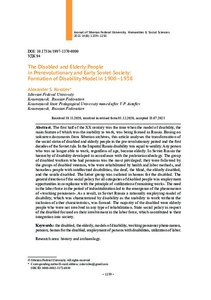The Disabled and Elderly People in Prerevolutionary and Early Soviet Society: Formation of Disability Model in 1900–1938
Скачать файл:
URI (для ссылок/цитирований):
https://elib.sfu-kras.ru/handle/2311/143571Автор:
Kovalev, Alexander S.
Ковалев, А. С.
Дата:
2021-08Журнал:
Журнал Сибирского федерального университета. Гуманитарные науки. Journal of Siberian Federal University. Humanities & Social Sciences; 2021 14 (8)Аннотация:
The first half of the XX century was the time when the model of disability, the main feature of which was the inability to work, was being formed in Russia. Basing on unknown documents from Siberian archives, this article analyses the transformation of the social status of disabled and elderly people in the pre-revolutionary period and the first decades of the Soviet rule. In the Imperial Russia disability was equal to senility. Any person who was no longer able to work, regardless of age, became elderly. In Soviet Russia the hierarchy of disability developed in accordance with the proletarian ideology. The group of disabled workers who had pensions was the most privileged; they were followed by the groups of disabled veterans, who were rehabilitated by health and labor methods, and homeless people with intellectual disabilities, the deaf, the blind, the elderly disabled, and the senile disabled. The latter group was isolated in homes for the disabled. The general direction of the social policy for all categories of disabled people was employment opportunities in compliance with the principle of «utilization of remaining work». The need in the labor force in the period of industrialization led to the emergence of the phenomenon of «working pensioner». As a result, in Soviet Russia a rationally employing model of disability, which was characterized by disability as the inability to work without the inclusion of other characteristics, was formed. The majority of the disabled were elderly people who were not involved in any type of rehabilitation. State social policy in respect of the disabled focused on their involvement in the labor force, which contributed to their integration into society В первой половине ХХ века в России происходит оформление модели
инвалидности, основной характеристикой которой была нетрудоспособность.
Основываясь на неизвестных документах сибирских архивов, автор рассматривает
трансформацию социального статуса инвалидов и пожилых людей в дореволюционный
период и первые десятилетия советской власти. В имперской России инвалидность
приравнивалась к старости. Престарелым становился любой человек, кто
больше не мог трудиться, независимо от возраста. В большевистской России
в соответствии с пролетарской идеологией сложилась иерархия инвалидности.
Наиболее привилегированной была группа инвалидов труда, которые пользовались
пенсионным обеспечением, далее следовала группа инвалидов войны,
которых
реабилитировали медицинскими и трудовыми методами, и «беспризорные»
инвалиды – с интеллектуальными нарушениями, глухонемые, незрячие, а также
пожилые инвалиды, или инвалиды старости. Последнюю группу изолировали
в инвалидные дома. Общим направлением социальной политики для всех категорий
инвалидов было возможное трудоустройство в соответствии с принципом «утилизации
оставшегося труда». Потребность в трудовых ресурсах в период индустриализации
привела к появлению феномена «работающего пенсионера». В результате в Советской
России сформировалась рационально-трудовая
модель, для которой было характерно
понимание инвалидности как неспособности к труду без включения других
характеристик. Основную массу инвалидов составляли пожилые люди, которые
не были вовлечены ни в один из видов реабилитации. Государственная социальная
политика в отношении нетрудоспособных была ориентирована на вовлечение
инвалидов в трудовые процессы, что способствовало их интеграции в общество
Коллекции:
Метаданные:
Показать полную информациюСвязанные материалы
Показаны похожие ресурсы по названию, автору или тематике.
-
Defensive Mechanisms of Behavior and Conceptual Sets in Socio-Psychological Adaptation of Children with Intellectual Disabilities
Chereneva, Elena A.; Черенёва, Е.А. (Сибирский федеральный университет. Siberian Federal University., 2013-09)The article is concerned with one of the urgent issues of special psychology and pedagogy, i.e. psychological defense mechanisms and conceptual attitude of schoolchildren with intellectual disabilities as a factor in ... -
Социокультурное исследование досуговых потребностей и предпочтений людей с ограниченными возможностями, проживающими в городе Красноярске
Копцева, Н.П.; Koptseva, Natalia P.; Бахова, Н.А.; Bakhova, Natalia A.; Замараева, Ю.С.; Zamaraeva, Julia S. (Сибирский федеральный университет. Siberian Federal University., 2012-03)This article focuses on monitoring and analysis of contemporary cultural needs of people with disabilities living in the city of Krasnoyarsk with the purpose to identify the system of cultural values and to form current ... -
Использование электронных курсов при реализации образовательных программ «Физическая культура и спорт», «Прикладная физическая культура и спорт» для студентов специального учебного отделения
Картавцева, А. И.; Садырин, С. Л.; Дергач, Е. А.; Брюханова, Н. А.; Kartavtseva, Anna I.; Sadyrin, Sergey L.; Dergach, Elena A.; Bryukhanova, Nina A. (Сибирский федеральный университет. Siberian Federal University, 2021-02)В статье приведены статистические данные о количестве студентов СФУ, имеющих инвалидность (в 2013, 2014 и 2020 гг.), а также количество студентов 1 курса, зачисленных в специальное учебное отделение кафедры физической культуры ... -
On Expanding the Opportunities for Disabled People to Lead an Independent Lifestyle in Their Chosen Place of Residence and Integration into the Local Community
Starobina, Elena M.; Ishutina, Inna S; Kozhushko, Ludmila A.; Chernyakina, Tatiana S.; Vladimirova, Oksana N.; Rocheva, Yana S.; Raduto, Vladimir I.; Khodakovskiy, Matvei D.; Старобина, Е. М.; Ишутина, И. С.; Кожушко, Л.А.; Чернякина, Т. С.; Владимирова, О. Н.; Рочева, Я. С.; Радуто, В. И.; Ходаковский, М. Д. (Journal of Siberian Federal University. Сибирский федеральный университет, 2023-12)The object of the study is social relations that determine the main approaches to the organization of an independent lifestyle of disabled people in the Russian Federation. The subject of the study is the rights of persons ... -
Charity Support of Russia from the Russian Ethnic Community in Australia at the end of the 20th – beginning of the 21st centuries
Vasil’eva, Viktoriya E.; Васильева, В.Э. (Сибирский федеральный университет. Siberian Federal University, 2016-06)The article gives an overview of some charity organizations of Russian Australians that provide support to Russian children, disabled people, the elderly. Love for people and the desire to do good continually, inspire ...

